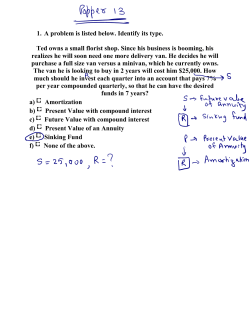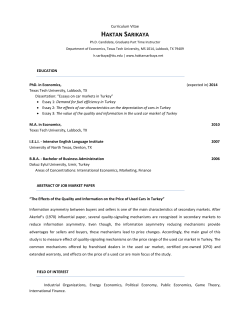
H u ow
How to Use this Handbook The Handbook of Undergraduate Studies contains the 2010 Macquarie University undergraduate teaching program and will provide you with a guide and reference throughout your studies at Macquarie. It is your responsibility to read the Handbook and to familiarise yourself with the requirements of your degree and Macquarie’s formal administrative procedures. This Handbook should be your first source of information if you have any queries concerning your course, enrolment or studies. The Handbook is published each year as a paper copy and subsequently maintained as an up-to-date online resource. While the information in this Handbook is correct at the time of printing, you should be aware that the information in the online Handbook is updated as changes occur throughout the year, and that it supersedes the information in the printed Handbook. You can find the online Handbook at www.handbook.mq.edu.au This section and the glossary on page 15 contain information you will need to understand and interpret the Handbook content. Close examination of these two sections will make using the Handbook straightforward. Quick guide to planning your study Most aspects of undergraduate courses at Macquarie are governed by the Undergraduate Rules, found on page 477 of this Handbook. The University also has policies and procedures which direct the day-to-day implementation of these rules. A brief summary of the areas covered by these policies can be found in the Student Information section of this Handbook, or online at www.mq.edu.au/policy/. In the Handbook the Schedule of Programs Currently Open for New Admissions, Schedule of Majors, Schedule of Undergraduate Units and the Schedule of People and Planet Units contain all the components of your degree. Consult these sections in order to plan and successfully complete your degree. Handbook of Undergraduate Studies: Step by Step Find your program in the Schedule of Programs of Study Currently Open for New Admissions which starts on page 22. If your program is structured on majors, If your program is not structured on majors, Check the Schedule of Majors, and Check the Schedule of Units, the Schedule of People and Planet Units, and the Unit Descriptions. Check the Schedule of Units, the Schedule of People and Planet Units, and the Unit Descriptions. 5 Handbook of Undergraduate Studies—2010 Step 1: Find your program Schedule of Programs of Study Currently Open for New Admissions This schedule lists all available programs as well as the general and specific minimum requirements which must be met to be eligible to graduate. The programs for Bachelor degrees are listed first, followed by programs for Certificates, Diplomas, Graduate Certificates, Graduate Diplomas and then Honours degrees. Within each of these categories the programs are listed alphabetically. Often there is more than one combination of units (or study path) which will satisfy the requirements of the program. Each program gives a sum of the minimum credit points needed to meet all requirements. Depending on the path your studies take, you may need to complete more credit points/units to meet the requirements of your program. The balance of credit points required is the difference between the total credit points required for the program and the minimum credit points needed to meet the specific minimum requirements; it represents the extra room in your program to meet general requirements or for electives. How to use the Schedule of Programs of Study Program name Program code Bachelor of Actuarial Studies ACTS01 Faculty: Award: Faculty of Business and Economics Bachelor of Actuarial Studies (BActStud) General requirements: Minimum number of credit points for the degree 68 Minimum number of credit points at 200 level or above 38 Minimum number of credit points at 300 level or above 18 See the Schedule of People and Completion of a designated People unit Completion of a designated Planet unit Planet Units for a list of these units Completion of other specific minimum requirements as set out below In order to graduate students must ensure that they have satisfied all of the general requirements of the degree: see the general requirements listed above. Unit codes Specific minimum requirements: 100 level Required Required Required Required Required ACST101 ACST152 MATH133 STAT171 MATH132 MATH135 either or 200 level Required ACST202 100 level is generally first year. Required ACST212 Use these levels as a guide for Required ACST255 Required STAT271 enrolment. Required STAT272 300 level Capstone Required Required 7cp from Techniques and Elements of Finance Introduction to Actuarial Studies Mathematics IB (Advanced) Statistical Data Analysis Mathematics IA (Advanced) Mathematics IA Credit points 3 Unit names 3 3 3 Mathematics of Finance Combinatorial Probability Contingent Payments 1 Statistics I Probability ACST302 Actuarial Capstone ACST354 Survival Models ACST units at 300 level In some programs you may need to choose electives that count towards your general requirements TOTAL CREDIT POINTS REQUIRED FOR THIS PROGRAM 3 3 3 3 3 3 4 4 7 Balance of credit points required: Electives 23 68 Any additional information about the program will appear here 6 2 How to Use this Handbook The balance of credit points will vary depending on the path you take to meet the specific minimum requirements of your program. In Bachelor degrees, you will need to use this balance to meet some of the general requirements—such as People and Planet units—or you may also be able to use this balance for electives. Be sure to re-check the general requirements for your program before deciding on your electives. You should consult the requirements of your program every time you enrol, discontinue or withdraw from units of study. It is important to track your progress against your program to make sure you satisfy all requirements. Step 2: Check whether your program is structured on majors If it is, check the Schedule of Majors before you go to step 3. If not, go directly to step 3. Schedule of Majors The Schedule of Majors lists all available majors, sorted alphabetically, and their requirements. If your program requires that you complete a major, then check the Schedule of Majors—you must make sure that you meet all the requirements for that major as listed in the Schedule of Majors. Should you wish to complete an additional major, you will need to consult the Schedule of Majors to understand the requirements of the second major, and how (and if) you can fit it in with the requirements of your program. If your program does not require that you complete a major, then you cannot qualify for any major within the program— you should consult the Schedule of Undergraduate Units in conjunction with your program of study. How to use the Schedule of Majors Major code Major name Linguistics Faculty: Department: LIN01 Faculty of Human Sciences Department of Linguistics This major must be completed as part of a degree. The general requirements for the degree must be satisfied in order to graduate. Unit codes Requirements for the Major: Completion of a minimum of 24 credit points including the following prescribed units: 100 level Required LING110 100 or 200 level Required 3cp from 100 level LING unit orUnit LINGnames 210-240 3 200 level Required 6cp from LING210 - LING240 6 300 level Capstone Required 9cp from LING399 Language as Evidence 300 level units from LING, SPH units 3 9 TOTAL CREDIT POINTS REQUIRED TO SATISFY THIS MAJOR 24 Language: Its Structure and Use Credit points 3 Any additional information about the major will appear here 7 Handbook of Undergraduate Studies—2010 Step 3: Check the details of each unit Schedule of Undergraduate Units, Unit Descriptions and Schedule of People and Planet Units Use these sections to check the details of each unit. The Schedule of Undergraduate Units lists the availability of each unit, its prerequisites, corequisites and contact hours. Units within the Schedule have been ordered alphabetically according to unit code. Every unit on offer has been assigned a name and alpha numeric identification code. The code is three or four letters to represent the subject area of the unit; followed by one digit to represent the level of the unit (1 = 100 level, 2 = 200 level, 3= 300 level, 4 = 400 level, 5= 500 level) and two further digits to distinguish the particular unit. A full list of the identification codes can be found on page 11. When choosing units, it is important to understand their availability so that you can plan ahead. The ‘When Offered’ column of the Schedule of Units will help you to plan your year of study. Note: this section does not contain the timetable for scheduling of individual classes; that information is available from the timetables page at www.timetables.mq.edu.au or your eStudent account. Prefixes D indicates Day, classes begin before 6pm E indicates Evening, classes begin after 6pm NHS2 indicates that the unit is offered in Northern Hemisphere Study Period 2 Summer Session indicates Offered in January–February 2009 as part of the Summer School program. TBD indicates that the offering is to be determined V2 indicates Vacation study: December 2009 – February 2010 WV indicates Winter vacation session X indicates External study Xc indicates Composite mode. Suffixes 1 Offered in the first half-year 2 Offered in the second half-year 3 Offered over the full year On campus sessions Some units require you to attend an on campus session; voluntary attendance is indicated by (V), field work by (F). Please see the glossary for explanations of prerequisite, corequisite, NCCW and designation. The Schedule of People and Planet Units lists all units which have been designated as either a People or Planet unit. People units focus on the challenges of contemporary society and on what it means to be ethical, local and global citizens. Planet units help students to understand the nature of science and the challenges and issues facing the planet, with a particular focus on sustainability. Consult the Schedule of People and Planet units in conjunction with your program and, if relevant, major. You need to complete a People unit and a Planet unit to meet the requirements of your program. One of these units needs to be a unit offered outside of your Department and the other outside of your Faculty. Your Department is either the department responsible for your qualifying major or, in the case you do not have a qualifying major, the department responsible for your degree. The Unit Descriptions give a brief overview of the content of each unit as well as the academic member of staff who is the contact for the unit. This section includes the staff contact, class contact hours and the department offering each unit. Remember if you have read through this Handbook and are still unsure about your program of study—or simply want to make sure that you have understood all of your options—then please seek academic advice. 8 How to Use this Handbook How to use the Schedule of Units Session Dates This column lists the dates of any lecture, tutorial, block practical session or fieldwork for the unit. Summer Session Summer Session D1 D2 D2 D1 D1 D2 ECON214, ECON201, D2 ECON204 D2 ECON215, ECON200, D1 ECON203 E2 E1 D2 D1 D2 X2 D1 This column lists when classes for the unit are available. Eg: AHIS222 is run in the second half-year during day classes and externally. This column lists any units you may not count towards your degree with the unit. ECON392 ECON361 BBA316 PHYS378 Eg: if you study ASTR377 you may not also count PHYS377 towards your degree. This column lists any units you may not count towards your degree with the unit. Eg: if you study ASTR377 you may not also count PHYS377 towards your degree. (Admission to BBA or BeBus or BCom or BCom-Mktg) and 24cp BBA102 MATH235 PHYS377 AHIS322, AHST235, AHST335 Corequisites NCCW D2 When Offered 8 October Eg: AHIS222 has an on campus session on 8 October. ECON110 or ECON111 or BBA103 36cp and (STAT170 or STAT171) ECON110 or ECON111 or BBA103 ECON111 or BBA103 PHYS202(P) and MATH235(P) PHYS201(P) and PHYS202(P) Eg: ‘12 cp’ means that you must have completed at least 12 credit points before enrolling; PHYS201(P) and PHYS202(P) means you must have received at least a pass in PHYS201 and PHYS202 before enrolling. Commerce; Economics 3 3 Business Forecasting 3 Business Models and Organisation Structure 3 Business Communications 3 Applied Macroeconomics Applied Microeconomics Organisational Behaviour This column lists the unit name. Asian Business Environment Commerce; Economics Commerce; Economics Commerce; Economics Commerce; Economics 3 3 This column lists the credit point value of the unit. BBA320 BBA315 BBA280 BBA216 BBA214 BBA204 This column lists the unit’s alphanumeric code: three or four letters followed by three digits. The letters represent the subject area, and numbers the level. Eg: AHIS222 is an Ancient History unit at 200 level. BBA111 Science Commerce; Economics 3 3 General Relativity and Cosmology Principles of Management BBA102 ASTR378 Astrophysics I 3 Science Eg: ASTR377 is a science unit. Commerce; Economics This column lists the unit’s designation/s. ASTR377 Byzantium, East and West AHIS222 Code Name 4 Credit Unit Designation Points 12cp Prerequisites This column lists any units or requirements you must complete before you may enrol in the unit. 9 Unit Identification codes Abbreviation Identification Code Name Faculty Department ABEC Aboriginal Early Childhood Faculty of Human Sciences Institute of Early Childhood ABEP Aboriginal Educational Practice Faculty of Human Sciences Institute of Early Childhood ABFS Aboriginal Foundation Studies Faculty of Arts Department of Indigenous Studies—Warawara ABSP Aboriginal Studies Perspectives Faculty of Arts Department of Indigenous Studies—Warawara ABST Aboriginal Studies Faculty of Arts Department of Indigenous Studies—Warawara ACBE Academic Communication in Business and Economics Faculty of Human Sciences Department of Linguistics ACCG Accounting and Financial Management Faculty of Business and Economics Department of Accounting and Finance ACSC Academic Communication in Science Faculty of Human Sciences Department of Linguistics ACSH Academic Communication in the Social Sciences and Humanities Faculty of Human Sciences Department of Linguistics ACST Actuarial Studies Faculty of Business and Economics Department of Actuarial Studies AHIS Ancient History Faculty of Arts Department of Ancient History AHMG Ancient History Modern Greek Faculty of Arts Department of Ancient History ANTH Anthropology Faculty of Arts Department of Anthropology ASN Asian Studies Faculty of Arts Department of International Studies ASTR Astronomy Faculty of Science Department of Physics and Engineering BBA Business Administration Faculty of Business and Economics Department of Business BBE Brain, Behaviour and Evolution Faculty of Science Department of Brain, Behaviour and Evolution BCM Bachelor of Community Management Faculty of Arts Department of Indigenous Studies—Warawara BIOL Biology Faculty of Science Department of Biological Sciences BUS Business Faculty of Business and Economics Department of Business BUSL Business Law Faculty of Business and Economics Department of Business Law CBMS Chemistry Biomolecular Sciences Faculty of Science Department of Chemistry and Biomolecular Sciences CHIR Chiropractic Faculty of Science Department of Chiropractic CHN Chinese Faculty of Arts COMP Computing Faculty of Science Department of International Studies Department of Computing CRO Croatian Faculty of Arts Department of International Studies 11 Handbook of Undergraduate Studies—2010 Abbreviation 12 Identification Code Name Faculty Department CUL Critical and Cultural Studies Faculty of Arts Department of Media, Music and Cultural Studies DANC Dancing Faculty of Arts Department of Media, Music and Cultural Studies DEM Demography Faculty of Business and Economics Department of Business DMTH Discrete Mathematics Faculty of Science Department of Mathematics ECH Early Childhood Education Faculty of Human Sciences Institute of Early Childhood ECHH Early Childhood Education Faculty of Human Sciences Institute of Early Childhood ECHL Early Childhood Education Faculty of Human Sciences Institute of Early Childhood ECHP Early Childhood Education Faculty of Human Sciences Institute of Early Childhood ECON Economics Faculty of Business and Economics Department of Economics ECST Early Childhood Studies Faculty of Human Sciences Institute of Early Childhood EDUC Education Faculty of Human Sciences Department of Education ELEC Electronics Faculty of Science Department of Physics and Engineering ENGG Engineering General Faculty of Science Department of Physics and Engineering ENGL English Literature Faculty of Arts Department of English ENV Environment and Geography Faculty of Science Department of Environment and Geography ENVE Environmental Science Faculty of Science Department of Environment and Geography ENVG Human Geography Faculty of Science Department of Environment and Geography EUL European Languages (general) Faculty of Arts Department of International Studies EXLW Exchange Law Study Abroad Faculty of Arts Macquarie Law School FBE Faculty of Business and Economics Faculty of Business and Economics FIN Applied Finance Faculty of Business and Economics FOAR Faculty of Arts Faculty of Arts FOBE Faculty of Business and Economics Faculty of Business and Economics FOHS Faculty of Human Sciences Faculty of Human Sciences FOSC Faculty of Science Faculty of Science Department of Business Department of Economics Unit Identification Codes Abbreviation Identification Code Name Faculty Department FRN French Faculty of Arts Department of International Studies GEN Gender Studies Faculty of Arts Department of Sociology GEOS Earth Sciences Faculty of Science Department of Environment and Geography GMN German Faculty of Arts Department of International Studies HLTH Health Faculty of Science Department of Chiropractic HRM Human Resource Management Faculty of Business and Economics Department of Business ICOM International Communication Faculty of Arts Department of Media, Music and Cultural Studies INFO Information Technology Faculty of Science Department of Computing INTS International Studies Faculty of Arts IPBA Education and Linguistics Faculty of Human Sciences Department of International Studies Department of Education ISYS Information Systems Faculty of Science Department of Computing ITEC Information Technology Faculty of Science Department of Computing ITL Italian Faculty of Arts Department of International Studies JPS Japanese Studies Faculty of Arts Department of International Studies LAW Law Faculty of Arts Macquarie Law School LEX Law Faculty of Arts Macquarie Law School LING Linguistics Faculty of Human Sciences Department of Linguistics MAR Marine Science Faculty of Science Department of Biological Sciences MAS Media and Communication Studies Faculty of Arts Department of Media, Music and Cultural Studies MATH Mathematics Faculty of Science Department of Mathematics MCD Macedonian Faculty of Arts Department of International Studies MGK Modern Greek Faculty of Arts Department of International Studies MHIS Modern History Faculty of Arts Department of Modern History, Politics, International Relations and Security 13 Handbook of Undergraduate Studies—2010 Abbreviation Faculty Faculty of Business and Economics Department MKTG Marketing MMCS Media, Music and Cultural Studies Faculty of Arts Department of Media, Music and Cultural Studies MPP Education and Linguistics Faculty of Human Sciences Department of Education MSM Museum Studies Faculty of Science Department of Environment and Geography MUS Music Faculty of Arts Department of Media, Music and Cultural Studies PHL Philosophy Faculty of Arts Department of Philosophy PHTN Photonics Faculty of Science Department of Physics and Engineering PHYS Physics Faculty of Science Department of Physics and Engineering PLH Polish Faculty of Arts Department of International Studies POL Politics Faculty of Arts PSY Psychology Faculty of Human Sciences Department of Psychology RSN Russian Faculty of Arts Department of International Studies SCOM Science Communication Faculty of Science Department of Physics and Engineering SOC Sociology Faculty of Arts Department of Sociology SPED Special Education Faculty of Human Sciences Institute of Human Cognition and Brain Science SPH Speech and Hearing Faculty of Human Sciences Department of Linguistics SPN Spanish Faculty of Arts Department of International Studies SSC Social Science Faculty of Arts Department of Sociology STAE Statistics - (GradCert students) Faculty of Science Department of Statistics STAT Statistics Faculty of Science Department of Statistics TEP Teacher Education Faculty of Human Sciences Department of Education 14 Identification Code Name Department of Business Department of Modern History, Politics, International Relations and Security
© Copyright 2025





















